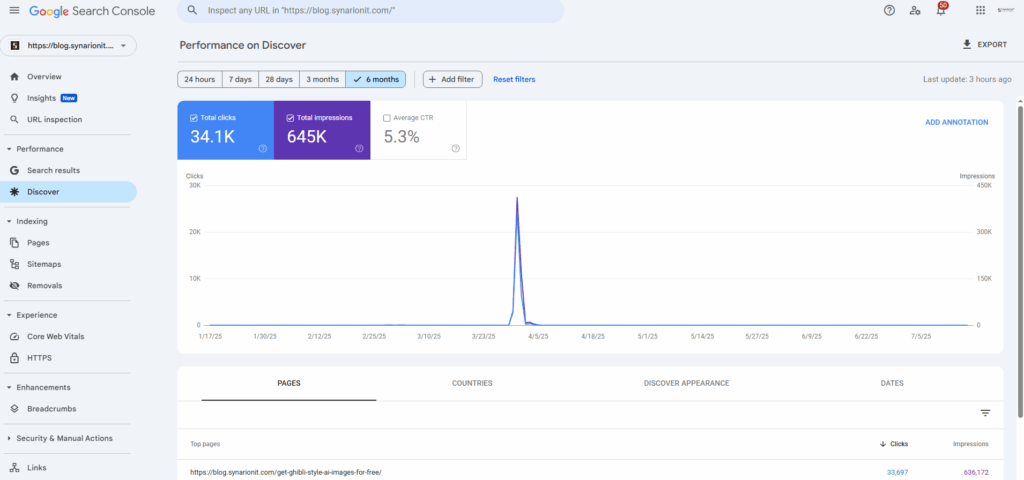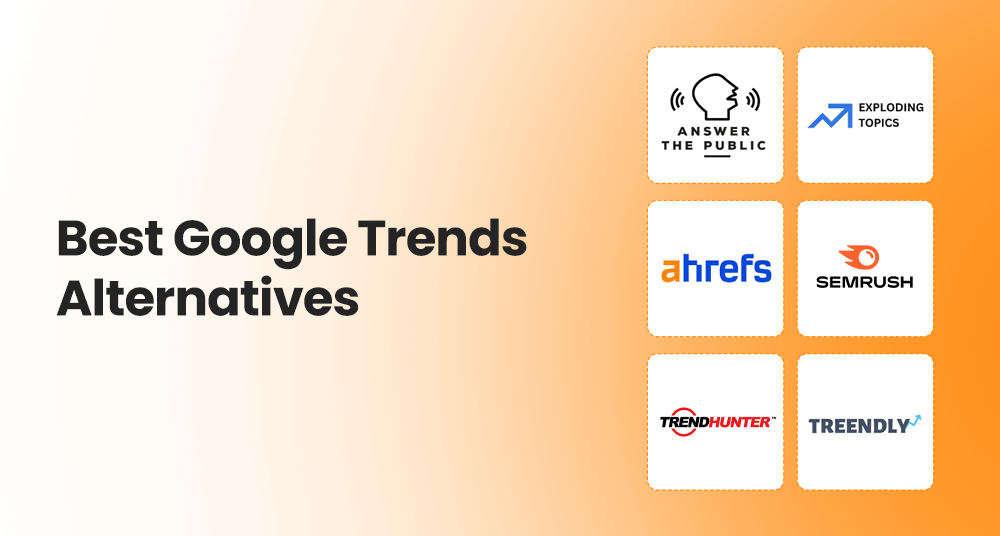In today’s digital marketing and SEO landscape, understanding search trends is vital to stay ahead of the curve. Google Trends has long been the go-to platform for marketers, analysts, and content creators to monitor search interest patterns and discover trending topics. However, as we approach 2025, the limitations of Google Trends have become more apparent, prompting many to seek robust Google Trends alternatives that offer deeper insights, predictive capabilities, and more diverse data sources.
Whether you’re a marketer aiming to craft content that resonates, a product manager scouting market demand, or an entrepreneur wanting to spot emerging trends, finding the right tool is essential. This comprehensive guide will explore why you might need to look beyond Google Trends and introduce the top alternatives to Google Trends for 2025, helping you choose the perfect Google Trends substitute tailored to your needs.
What is Google Trends?
Google Trends is a free tool by Google that analyzes the popularity of search queries across regions and languages over time. It provides normalized data on the relative search interest for specific keywords, visualized through graphs and heat maps. Users can compare the popularity of terms, view trending searches, and identify seasonal search behaviors. While Google Trends excels at offering a quick snapshot of search behavior, its data is relative rather than absolute and often lacks in-depth context or detailed keyword metrics. As a result, many marketers and researchers seek Google Trends alternatives that provide richer, more actionable data.
Real-Life Case Study: Synarion’s Traffic Growth Using the Ghibli Trend

In this real-life case study, we explore how Synarion strategically used Google Trends to tap into the growing popularity of Studio Ghibli. By identifying a surge in global interest around Ghibli content, Synarion aligned its content marketing and SEO services to create trend-based blogs, visuals, and landing pages that matched rising search intent. Through keyword optimization and timely publishing, the company saw a significant boost in organic traffic within weeks. This approach not only increased user engagement but also improved their overall Google search rankings. The Blog approximately gets 33k+ Clicks and 6 Lakh+ Impressions.
See Full Blog: Get Ghibli Style AI Images for Free
Leveraging Google Trends allowed Synarion to act quickly on relevant topics, showcasing how data-driven SEO services can lead to measurable growth. The success of this campaign highlights the importance of staying agile and responsive to digital trends in today’s competitive online landscape. Synarion’s story is a strong example of how timely content and strategic SEO can deliver impactful results.
Why Look Beyond Google Trends?
Although Google Trends is an excellent starting point for understanding general search interest, it is not without its limitations, especially in the fast-evolving digital ecosystem of 2025. Here are several reasons why you might consider looking beyond Google Trends and exploring alternatives to Google Trends:
Relative vs. Absolute Data
Google Trends provides normalized data, showing relative interest rather than absolute search volumes. This means you can see how interest rises or falls over time but not the exact number of searches. For marketers and SEO specialists who need precise volume data to estimate traffic potential, this is a significant limitation. Many Google Trends alternatives offer absolute search volume, keyword difficulty, and competitive metrics that are essential for data-driven decisions.
Limited Historical Depth
While Google Trends allows you to explore data going back several years, some users require more extensive historical datasets to perform trend forecasting or long-term market analysis. Certain Google Trends substitutes provide deeper historical insights and richer contextual data.
Lack of Predictive Analytics
Google Trends is mostly reactive — it shows past and present data but doesn’t forecast future trends. As AI and data analytics mature, tools now incorporate predictive models to help marketers anticipate which topics will gain momentum. This forecasting capability is a hallmark of many advanced Google Trends alternatives in 2025.
Narrow Data Sources
Google Trends aggregates data solely from Google Search. However, in 2025, digital attention is fragmented across platforms like social media, e-commerce sites, video platforms, and forums. Alternatives to Google Trends often combine multiple data sources — including social listening, content performance, and marketplace data — to offer a more holistic picture of trends.
Industry-Specific Insights
Google Trends is a general-purpose tool and lacks tailored insights for specific industries or niches. For example, trends in fashion, tech, or health often require specialized tools that understand the nuances of each market segment. Many Google Trends alternatives provide industry-specific dashboards and trend analyses, allowing marketers to drill down by vertical or region.
User Interface and Usability
While Google Trends is user-friendly, some users desire tools with more advanced filtering, export options, and integration with other marketing platforms. In contrast, many Google Trends substitutes offer seamless integration with SEO tools, CRM systems, or social media dashboards to streamline workflow.
Given these factors, exploring Google Trends alternatives and evaluating them based on your specific needs can significantly enhance your ability to spot, analyze, and capitalize on emerging trends in 2025 and beyond.
Top Google Trends Alternatives in 2025
#1. AnswerThePublic
AnswerThePublic visualizes search queries by grouping related questions and phrases around keywords, making it a fantastic tool for content ideation. It helps marketers understand what their audience is asking, providing a deep dive into user intent beyond mere search volume. As a Google Trends substitute, it excels at uncovering long-tail keywords and common concerns, empowering content creators to craft relevant and targeted material.
#2. Exploding Topics
Exploding Topics uses AI to identify emerging trends before they become mainstream. It analyzes search data, social media chatter, and news to highlight rapidly growing topics across industries. Offering both free and paid plans, it’s an excellent choice for businesses aiming to stay ahead by spotting viral trends early. Its predictive approach makes it a valuable alternative to Google Trends for marketers looking for future-facing insights.
#3. Glimpse
Glimpse focuses on visual and video content trends across platforms like TikTok, YouTube, and Instagram. By tracking viral content and emerging creators, Glimpse helps marketers understand cultural moments and audience interests in real-time. This makes it a unique Google Trends alternative, particularly for brands invested in influencer marketing and social media engagement.
#4. Ahrefs
Ahrefs is a powerhouse SEO suite known for its comprehensive keyword database, backlink analysis, and competitive intelligence. Unlike Google Trends, Ahrefs provides absolute search volumes, keyword difficulty scores, and detailed SERP analyses. Its robust keyword explorer makes it a top Google Trends substitute for SEO professionals seeking deep insights into keyword trends and competitive landscapes.
#5. Semrush
Semrush offers an all-in-one marketing toolkit including keyword research, site audit, and content marketing tools. Its keyword trend reports feature absolute volume data, CPC, and competitive density, giving marketers precise trend insights. The platform’s comprehensive analytics make it one of the most trusted Google Trends alternatives for agencies and enterprises.
#6. Trend Hunter
Trend Hunter specializes in consumer insights and innovation trends. It leverages crowdsourced data and expert analysis to identify emerging cultural and market trends. Trend Hunter is ideal for brands needing inspiration for product development or marketing campaigns, positioning it as a strategic Google Trends substitute for trendspotting beyond search data.
#7. Similarweb
Similarweb offers detailed web analytics and market intelligence. It tracks website traffic, referral sources, and keyword trends at a domain level, providing a broader understanding of digital market dynamics. Its multi-source data approach makes it a strong alternative to Google Trends for businesses wanting competitive and industry trend insights.
#8. Treendly
Treendly combines AI and multi-platform data to forecast trends across sectors like wellness, tech, and lifestyle. It provides curated, easy-to-digest trend reports and predictive analytics, allowing marketers to spot rising interest areas. Its industry-specific focus and affordable pricing make Treendly a popular Google Trends alternative for small businesses and startups.
#9. Pinterest Trends
Pinterest Trends tracks visual search patterns and trending pins in lifestyle, fashion, food, and home décor categories. It offers demographic filters by age and gender, helping brands align campaigns with emerging consumer preferences. As a niche Google Trends substitute, Pinterest Trends is invaluable for brands focused on visual storytelling and ecommerce.
#10. Ubersuggest
Created by Neil Patel, Ubersuggest is a budget-friendly SEO tool that provides keyword suggestions, search volume, and competitive analysis. It blends basic trend tracking with content ideas, making it accessible for small businesses and bloggers. Ubersuggest is a practical and user-friendly alternative to Google Trends for those needing straightforward keyword trend data.
Which Google Trends Alternative is Right for You?
Choosing the right Google Trends alternative depends largely on your specific goals, industry, and budget. Here’s a breakdown of which tools might best serve different needs:
For SEO Professionals and Agencies
If you require detailed keyword metrics, competitor analysis, and comprehensive search data, Semrush and Ahrefs stand out. Both platforms provide absolute search volumes, keyword difficulty, and trend data with historical depth, which Google Trends lacks. Their ability to analyze SERP features, backlinks, and paid advertising strategies makes them indispensable for full-scale SEO campaigns. While pricier, their advanced features justify the investment for professionals.
For Content Marketers and Bloggers
Tools like AnswerThePublic and Ubersuggest excel in content ideation and keyword suggestions. AnswerThePublic’s question visualization helps generate relevant content topics that align with user intent, while Ubersuggest offers affordable keyword data and competitive insights. These platforms are ideal for marketers aiming to boost organic traffic through well-targeted content without the need for complex SEO dashboards.
For Trend Spotters and Innovators
If your goal is to identify emerging trends before they hit mainstream, Exploding Topics and Trend Hunter offer predictive analytics and cultural insights beyond search volumes. Exploding Topics’ AI-driven model is perfect for early adopters looking for nascent trends in tech, health, or finance. Trend Hunter’s expert-curated trends assist product developers and brand strategists in tapping into consumer zeitgeists.
For Social Media and Visual Brands
Platforms like Glimpse and Pinterest Trends provide unique insights into viral video and visual content trends. Glimpse tracks short-form videos and influencer content, while Pinterest Trends captures lifestyle-related search interests with demographic breakdowns. These tools are vital for brands focused on social engagement, influencer collaborations, and ecommerce aesthetics.
For Market Intelligence and Competitive Analysis
If you want to understand broader market movements and competitor traffic beyond search queries, Similarweb offers multi-channel analytics and website trend data. Treendly’s industry-specific reports with forecasting add value for startups and SMEs needing cost-effective trend intelligence.
Closing Thoughts
While Google Trends remains a valuable resource for quick search interest snapshots, it no longer suffices as a standalone solution for marketers and businesses aiming to excel in 2025. The dynamic digital landscape demands more precise, predictive, and platform-diverse insights. Fortunately, numerous Google Trends alternatives now provide richer data, actionable forecasts, and niche-specific trend intelligence.
Whether you prioritize SEO depth, content ideation, social media virality, or market innovation, the tools outlined above offer a powerful set of options to complement or substitute Google Trends. Embracing these alternatives to Google Trends will help you stay ahead, adapt your strategies effectively, and uncover new growth opportunities. As you explore the market, consider your specific needs, budget, and industry focus to select the best Google Trends substitute that fits your 2025 marketing playbook.






What do you think?
It is nice to know your opinion. Leave a comment.